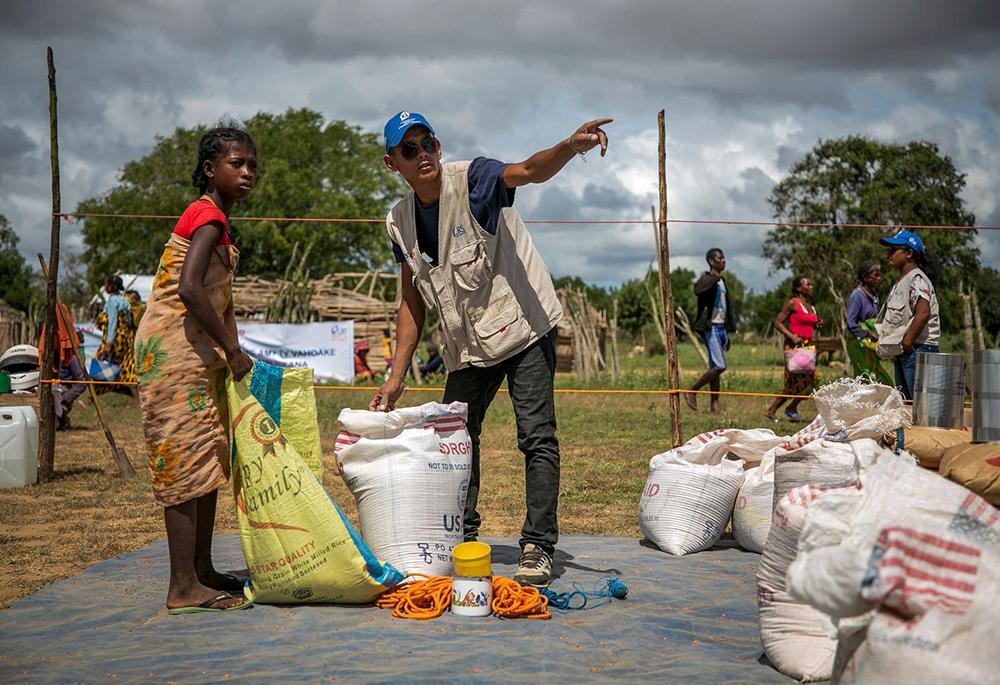

A Catholic Relief Services worker is pictured in a file photo helping a young woman at a food distribution area in Marojela village, located in the Marolinta commune in southern Madagascar’s Beloha District. On this day, 416 people from six villages received food. Over the past several years, the southern region of Madagascar has been affected by recurring droughts. (OSV News photo/Jim Stipe, courtesy Catholic Relief Services)
~ by Rhina Guidos, National Catholic Reporter
Catholic sisters say they won’t abandon the hungry, sick and dying whose numbers will increase because of the Trump administration’s February decision to cut global humanitarian aid through the U.S. Agency for International Development.
“We knew we’d reach this stage,” said Sr. Eneless Chimbali, a member of the Servants of the Blessed Virgin Mary of Blantyre, Malawi, and senior program officer for the All-Africa Conference: Sister to Sister.
Chimbali said sisters in Africa had discussed in 2015 what would happen if funding suddenly stopped for programs that help them feed those suffering hunger, those living with HIV/AIDS, and those who need education.
They recently had to face that reality after the Jan. 20 inauguration of U.S. President Donald Trump, who has allowed billionaire friend Elon Musk to gut government programs and the federal workforce. Musk said in an early February tweet that he had spent the weekend “feeding USAID into the wood chipper.”
According to the Associated Press, the Trump administration said in late February it was cutting $60 billion in U.S. humanitarian aid and over 90% of USAID’s foreign aid contracts.
Among the cuts were funds that help women religious and Catholic humanitarian organizations, such as Catholic Relief Services (CRS), carry out their mission.
That money was needed to save lives, to protect the vulnerable — not to waste, said Chimbali.
The New York Times obtained a memo from the acting assistant administrator for global health at USAID, with the publication reporting on some possible health consequences around the world from the withdrawal of aid. That included “up to 18 million additional cases of malaria per year … 200,000 children paralyzed with polio annually, and hundreds of millions of infections; one million children not treated for severe acute malnutrition, which is often fatal, each year” and “more than 28,000 new cases of such infectious diseases as Ebola and Marburg every year.”
Bill O’Keefe, CRS’s executive vice president for mission and mobilization and advocacy, said that while it’s a great idea to support organizations, “only governments can mobilize the kinds of resources at the scale needed to address these situations.” And while personal donations help a great deal, this is a moment to appeal to a greater power, too, he said.
“I think prayer, praying for a country whose hearts have hardened, that [hearts] might be softened,” he said. “And second, I really do encourage people to advocate. These cuts are made on a premise that the American people don’t care. I think we, as the American people, have to show them that we do.”
His organization’s website has a form online that Catholics can fill out electronically. It is automatically sent via email to lawmakers to let them know church members care about foreign aid and want it back.
“We’re trying to flood every office of Congress, Republicans and Democrats, so that they really understand how we, as Catholics, consider caring for our brothers and sisters around the world, have a critical moral responsibility,” O’Keefe said.
